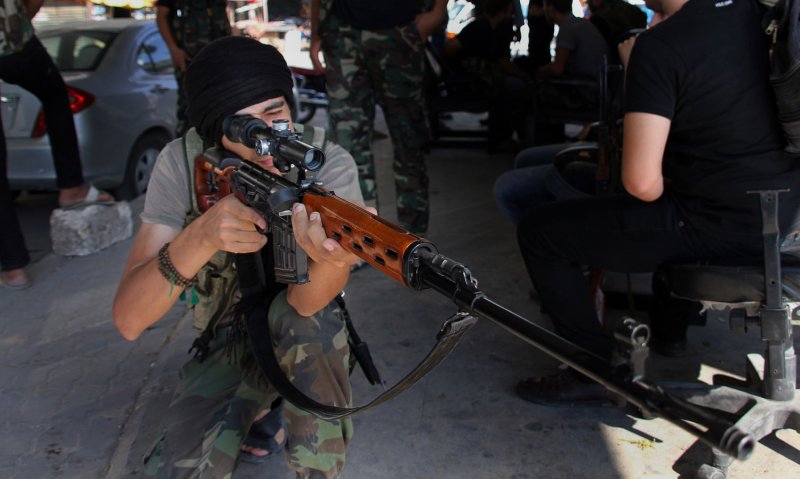Syrian rebel fighter surveys the situation in Aleppo, Syria, September 12, 2012. UPI/Ahmad Deeb |
License Photo
DAMASCUS, Syria, Dec. 15 (UPI) -- The United Nations is considering sending between 4,000 and 10,000 peacekeeping troops to Syria, a diplomatic official said.
The official said ministers of countries whose service personnel make up the U.N. peacekeeping force met Friday to discuss options for Syria, RIA Novosti reported.
One problem, the diplomatic source said, is the number of peacekeepers in the U.N. force.
"The problem is that the U.N. has no extra resources. The U.N. has a contingent of about 115,000 peacekeepers in various countries, but in order to send [a peacekeeping mission] to Syria, [the United Nations] will have to withdraw them from somewhere," the official, who spoke anonymously, said.
Lakhdar Brahimi, U.N. and Arab League envoy to Syria, said in November a peacekeeping mission was needed in Syria, devastated by a civil conflict that began in March 2011 over protests against President Bashar Assad. The violence between government troops and opposition forces has killed at least 40,000 people, activist groups estimate.
Syrian opposition groups have opposed an international peacekeeping mission in Syria, saying its presence would delay Assad's ouster.
In Europe, meanwhile, leaders indicated they would discuss lifting a ban on arming Syrian opposition forces, The Wall Street Journal reported.
Britain and France have led the effort to ease an arms embargo that prevents weapons from being shipped directly to opposition forces. This week, most of the European Union members formally recognized the new opposition alliance, the National Coalition for Syrian Revolutionary and Opposition Forces, as the legitimate representative of the Syrian people.
At a meeting Friday, British and French officials tried unsuccessfully to convince other countries that the arms embargo should be changed.
"We have been supplying [the Syrian opposition] with non-lethal equipment and the conversation now is what more should we do, what more can we do to help advise, work with, shape and support," British Prime Minister David Cameron said. "People will ask in future years ... what action did you take in order to help deal with this situation?"
Opponents to modifying the ban said supplying arms could increase the violence and expressed fear that the weapons could reach extremists or the Assad regime.
In a statement, the European Union said foreign ministers would be tasked "to work on all options to support and help the opposition and to enable greater support for the protection of civilians."
The Journal said the statement provides an opening for serious discussions about the arms ban when foreign ministers meet in January.
The Syrian Network for Human Rights said it documented 107 deaths Friday, including eight children and 12 women.
The most deaths were reported in Damascus and surrounding areas, with 49. Idlib had 20 deaths, followed by Daraa with eight; Alhasakah, seven; Dier Alzoor and Aleppo, six each; Homs, five; Hama, four; and Alqunaytirah, two.















